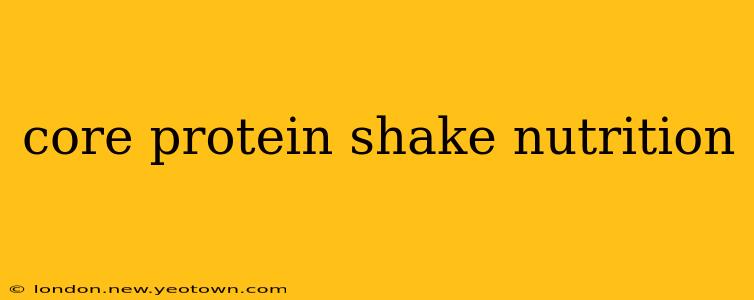Let's be honest, protein shakes have gotten a bad rap. Images of bulky bodybuilders guzzling down neon-green concoctions often spring to mind. But the truth is, a core protein shake, when formulated correctly, is a powerful tool for anyone looking to support their health and fitness goals – whether you're a seasoned athlete or simply aiming for a healthier lifestyle. This isn't about bulking up; it's about optimizing your nutritional intake for overall well-being.
My journey with protein shakes started years ago, not in a gym, but in my kitchen. I was struggling to hit my daily protein goals while juggling a demanding job and family life. Pre-made shakes felt overly processed, and frankly, expensive. So, I started experimenting, researching, and crafting my own blends. This blog post reflects years of learning and experimenting – a journey to uncover the core nutritional elements of a truly effective protein shake.
What are the key nutritional components of a core protein shake?
The foundation of a well-rounded protein shake is surprisingly simple: high-quality protein, healthy fats, and complex carbohydrates. Let's break down each component:
Protein: The Muscle Builder (and More!)
The star of the show is, of course, protein. This macronutrient is essential for building and repairing tissues, supporting immune function, and even contributing to satiety (feeling full). When choosing a protein source, prioritize quality over quantity. Options include:
- Whey Protein: A fast-digesting protein, ideal post-workout for muscle recovery.
- Casein Protein: A slow-digesting protein, perfect for nighttime consumption to support overnight muscle repair.
- Soy Protein: A plant-based option complete with all essential amino acids.
- Brown Rice Protein: Another plant-based choice, generally hypoallergenic.
The amount of protein you need depends on your individual goals and activity level. A general guideline is 0.8 grams of protein per kilogram of body weight for sedentary individuals, and more for those engaging in regular exercise.
Healthy Fats: Sustained Energy and Hormone Balance
Don't shy away from fats! Healthy fats are crucial for hormone production, nutrient absorption, and sustained energy. Good sources include:
- Avocado: Creamy and nutrient-rich, it adds healthy fats and fiber.
- Nuts and Seeds: Chia seeds, flax seeds, almonds, and walnuts provide healthy fats and essential fatty acids.
- Nut Butters: A convenient and tasty source of healthy fats. Choose varieties without added sugar.
Complex Carbohydrates: Fueling Your Body
Complex carbohydrates provide sustained energy and help regulate blood sugar levels. Excellent options include:
- Oats: A versatile base for many shakes, providing fiber and slow-releasing energy.
- Fruits: Berries, bananas, and other fruits add natural sweetness and vitamins.
- Sweet Potatoes (cooked and blended): A less common but highly nutritious addition.
What are the benefits of drinking a protein shake?
The advantages extend beyond muscle growth. A well-balanced protein shake can:
Support Muscle Growth and Repair: This is the most widely known benefit, especially important after intense workouts.
Increase Satiety: The protein and fiber content can help you feel fuller for longer, aiding in weight management.
Boost Nutrient Intake: A shake can be a convenient way to ensure you're getting enough essential vitamins and minerals, especially if you have a busy lifestyle.
Aid in Recovery: Post-workout, it can replenish glycogen stores and help your muscles recover.
How many calories should be in a core protein shake?
The ideal calorie count depends on your individual needs. A general guideline is to keep it between 300-500 calories, but adjust based on your daily calorie goals. It's crucial to track your intake to ensure your shake fits within your overall dietary plan.
What are the potential downsides of protein shakes?
While beneficial, excessive protein intake can strain your kidneys, and some individuals may experience digestive issues like bloating or gas. Always consult a healthcare professional before making significant dietary changes, especially if you have underlying health conditions. Also, be mindful of added sugars and artificial ingredients in pre-made shakes. Making your own allows for greater control over the ingredients.
Conclusion: Your Personalized Protein Powerhouse
Crafting a core protein shake is a journey of personalization. Experiment with different ingredients, find what works best for your body and taste preferences, and remember to always prioritize quality whole foods. With the right balance of protein, healthy fats, and complex carbohydrates, your protein shake can be a powerful ally in your pursuit of a healthier, more energized you. It's not just about the shake itself; it’s about understanding how it fits into your overall healthy lifestyle.

